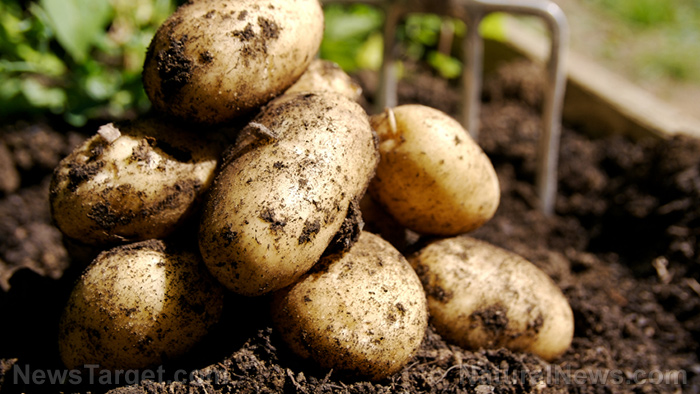Are potatoes healthy? Here’s the real score
05/07/2019 / By Zoey Sky

Potatoes are a controversial vegetable. They are usually associated with unhealthy foods like chips or French fries. However, when used in healthy recipes, potatoes can also be good for you.
Are potatoes really bad for you?
Potatoes are one of the most popular vegetables in the world. In fact, Americans eat an average of 126 pounds of potatoes annually.
A lot of health professionals recommend limiting potato consumption. Here are the three main reasons why potatoes are considered unhealthy:
- Potatoes are full of carbohydrates and some people believe carbs cause weight gain.
- Starch in potatoes are rapidly digested and they have a high glycemic load. This means potatoes can make your blood sugar and insulin levels spike then dip.
- Highly processed foods like French fries or potato chips – the most frequently eaten forms of potatoes – are confirmed to be unhealthy.
Potatoes and weight gain
In a 2011 study, Dr. Dariush Mozaffarian and his team at the Harvard T.H. Chan School of Public Health tracked the diet and lifestyle habits of 120,000 men and women for 20 years.
Mozaffarian and his fellow researchers examined how small food choices contribute to weight gain over time. Their findings showed that there is a connection between potatoes and weight gain.
The researchers warned that potato consumption is also associated with increased risks of heart disease and Type 2 diabetes.
However, in a 2014 study published in the Journal of the American College of Nutrition, researchers found that when people followed healthy recipes, they lost weight even after consuming five to seven servings of potatoes per week. (Related: The surprising health benefits of potatoes.)
Potato consumption and overall health
A study published in the Journal of Internal Medicine also showed that traditional indigenous populations that follow potato-heavy diets often have low rates of chronic diseases.
As of 1994, the traditional diet of the Kitavans of Papua New Guinea heavily consisted of sweet potatoes, yams, and other tubers. The researchers noted that despite this, they almost never suffered from strokes or heart disease. The Kitavans also had lower blood pressure and lower weight when compared with a Westernized population.
The Tukisentas, another native group, follow a diet that’s made up of more than 90 percent carbohydrates. Even though they mostly eat sweet potatoes, the Tukisentas are fit and healthy, with low and nearly non-existent rates of modern chronic diseases like heart disease and diabetes.
The Okinawans from Japan, who have the highest life expectancy in the world, also get more than 50 percent of their daily calories from a type of purple sweet potato.
The glycemic load of potatoes
When you consume carbohydrates, your blood sugar levels rise and fall. A food’s glycemic load (GL) determines the rate at which various amounts of carbohydrates are formed into glucose and released into the bloodstream.
Potatoes have a relatively high glycemic load, but this varies between different types of potatoes. Because of their high antioxidant content, colored potatoes (purple and red) have a lower glycemic load than white potatoes.
Eating potatoes can be healthy for most people, but there are three groups who need to limit their consumption, especially of white potatoes. They are the prediabetics, the diabetics, and individuals who are overweight.
If you have diabetes, your body is unable to properly produce or respond to insulin. You also can’t metabolize carbohydrates properly, which causes glucose concentrations to increase in the blood.
While literature on white potatoes is still incomplete, it is clear that there are other healthier sources of carbohydrates for people who are diabetic and obese. If you’re diabetic or overweight, consume fewer potatoes and eat more beans, cauliflower, greens, mushrooms, and onions.
The nutritional profile of potatoes
Different types of potatoes have different nutritional profiles, but they all share certain health benefits.
- Potatoes are full of antioxidants. Some potatoes contain more antioxidants than others, but all potatoes contain carotenoids, a class of plant pigments that fight chronic disease and inflammation.
- Potatoes can boost your digestion. Potatoes contain resistant starch, a type of starch that isn’t broken down by the small intestine. Instead, resistant starch reaches the large intestine and feeds your body’s beneficial bacteria. Inside the large intestine, good bacteria turn it into short-chain fatty acids like butyrate. Butyrate has anti-inflammatory effects in the gut and it can be used to treat inflammatory bowel diseases (IBD) like Crohn’s disease and ulcerative colitis.
- Potatoes can strengthen your bones. Potatoes contain minerals like calcium, iron, magnesium, phosphorus, and zinc that help the body build and maintain bone structure and strength. Take note that most of the minerals are in the potato skin, so leave potatoes unpeeled when preparing food.
When cooking potatoes, note that they are unhealthy when fried. A 2017 study published in the American Journal of Clinical Nutrition warned that eating fried potatoes two or more times per week can double your risk of death. You should also avoid processed foods like potato chips since they’re full of unhealthy fat and sodium.
As long as you eat potatoes with the skin intact, these starchy vegetables can help boost your digestion and improve your bone health.
Sources include:
Submit a correction >>
Tagged Under:
aging, antioxidants, blood sugar levels, bone health, carbohydrates, diabetes, diet, digestion, digestive health, food cures, food is medicine, functional food, glucose, glycemic load, heart disease, ingredients, organics, overweight, potatoes, prevention, research, starch, sweet potatoes, vegetables, weight gain
This article may contain statements that reflect the opinion of the author
RECENT NEWS & ARTICLES
FoodCures.News is a fact-based public education website published by Food Cures News Features, LLC.
All content copyright © 2018 by Food Cures News Features, LLC.
Contact Us with Tips or Corrections
All trademarks, registered trademarks and servicemarks mentioned on this site are the property of their respective owners.





















